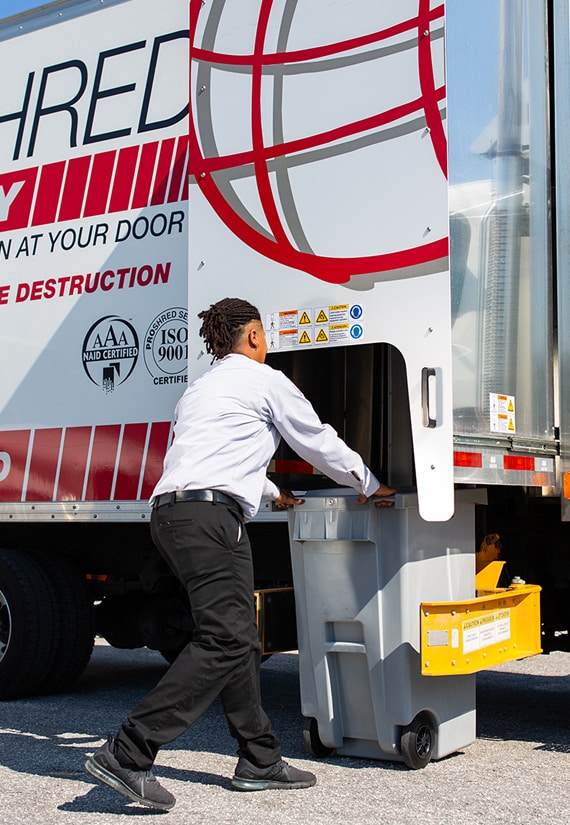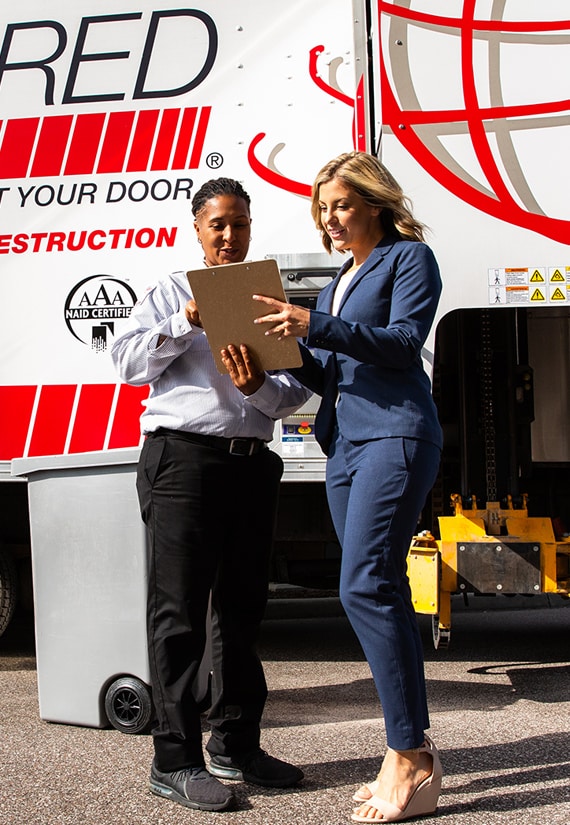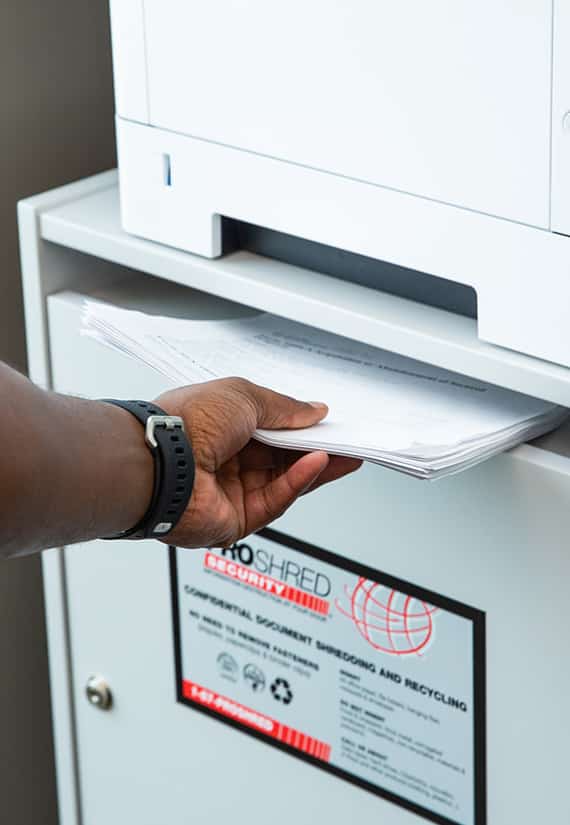July 14, 2022
The Ultimate Guide to Maintaining Data Security While Returning to the Workplace
By necessity, COVID-19 sent a lot of workers home to take up the mantle of the remote worker. While you probably had an on-site document destruction policy for these workers while they were in the office, you may not have thought about putting an at-home paper shredding policy in place once they became remote workers.
This guide covers some of the policies and guidelines you might want to think about putting into place for your remote workers. It also includes some suggestions for updating your policy to cover both your in-office and at-home workers. This guide will help you to understand the role that human error plays in data breaches, the importance of using a paper shred service and digital security service, and how often you should schedule and review these services.
Where Data Breaches Come From
Cybercriminals stealing a company’s data makes for some pretty exciting nightly news headlines, but unfortunately, that’s not where most data breaches come from. Whoa.com reveals that 52% of security breaches boil down to human error. This includes both consumer error and employee error.
These can include phishing scams, but often, they come down to sharing sensitive information with the wrong people or with password weakness.
However, they can also include non-digital issues, too. If your employees make any kind of paper documents, this can pose a risk, too. Given the suddenness of pandemic restrictions, you may not have thoroughly addressed how your employees should destroy their physical documents.
What You Can Do About It
Review Employee Training/ Update Your Training
It’s dangerous to assume that your employees will just know what to do with their digital files and documents. Without some direction from you, they’ll have no clue about your policy, or they may be operating under old policy guidelines. It isn’t fair to them, to your clients, or to your business to not give them some instruction on how to dispose of sensitive materials.
However, before you can train them, you first need to know what your feelings about the issue are. You also need to understand industry best practices. Once you know this information, then you can update your training materials to reflect your amended and expanded data security policies.
The Type of Data You Should Be Protecting
Both your in-office and remote employees should know what types of information would be of interest to a cybercriminal. People who commit these types of crimes are opportunistic. The sheer volume of information is of interest to them. If they steal a company’s information, there may be thousands of pieces of information that are no good to them from a financial standpoint.
However, as is often the case, there are usually thousands, if not millions of pieces of information that equal digital paydirt to them.
Cybercrime has proven itself to be a very lucrative business, costing the world $6 trillion in 2021. That’s a $3 trillion jump from 2015 when cybercrime accounted for $3 trillion worldwide.
In fact, cybercrime is so lucrative, that it has surpassed the illegal drug trade in terms of profits. These crimes include ransomware attacks, phishing schemes, and more. They can affect workers who, because of weak security measures, expose their employers’ data and their personal login information to the worldwide web.
The types of information you should think about protecting when you’re looking into digital security and paper shredding are as follows.
Financial data: As you can imagine, a person’s credit card information, pin numbers, bank account information, and more are usually of great interest to bad actors. These bad actors then set about ordering items online, stealing money from bank accounts, and spearheading other types of online financial crimes.
Customer and employee personal data: This information will include a person’s social security number, passwords, email addresses, phone numbers, home addresses, spouse and children’s names, and more. This information forms the basis of cyber theft. Used in the wrong hands, it has the power to destroy a person’s good standing with the credit reporting bureaus as criminals go on spending sprees and leave the bill in the hands of the person whose information they stole.
Medical records: If you’re like most people, you probably can’t imagine why anyone would want someone’s personal medical history. As it turns out, information about prescription drugs leads to illegal resales of those drugs on the black market. Personal medical histories can be turned into fraudulent insurance claims. Being sick is quite lucrative, at least from a cyber criminal’s point of view.
Shredding Services and Data Security
There are some additional practical things to consider as well, like if you’ll use a Tampa shredding service to take care of your paper documents, or if you’ll shred them in-house. However, unless you have experience with document destruction, you may want to avoid shredding your documents without professional supervision.
On a related note, you’ll want to determine how your remote workers will take care of the documents they’ve created as at-home workers. Since these documents likely contain sensitive information about your business or your clients, your remote employees can’t just throw them away.
Companies that do document shredding in Tampa, Florida often offer on-site document shredding services. They’ll come and pick up your sensitive work documents in secure trucks and destroy your company files so that cybercriminals can’t reconstruct client or business information from your employees’ paper files.


Cyber Security and Digital Data Security
Nowadays, digital security is as important, if not more important, than paper security, given how much work is conducted online. With hybrid workplaces, the issue becomes compounded because your security team needs to keep track of two sets of workers now, the ones that remain on-site and the ones who work remotely.
Many companies already had remote workers in place before the pandemic took hold, which allowed them to weather this storm pretty easily compared to the companies that didn’t.
Digital security is a sub-branch of cybersecurity, and many people use the two terms freely, meaning that for them, one is an exact substitute for the other.
While digital security can include cybercrimes, like identity theft, much of it is about preventive maintenance. This can include protecting your company’s data, assets, worker and client identity, and more.
Additionally, cybersecurity deals with the totality of a company’s infrastructure. This includes the system itself, as well as any information that belongs to your company.
Your digital data security should include measures for dealing with information, as well as hardware. For example, if you have old hard drives and any mixed media files you must figure out what to do with them.
Media you should destroy can include but is not limited to:
- Hard drives
- CDs/ DVDs
- X-Rays
- Older media platforms, like cassette tapes
Schedule Shredding Service And Data Security Disposal
For those who know they should look for document destruction services, finding a company that can take care of their needs may be as simple as doing a Google search for “document shredding near me.”
For others, it’s not so simple. They may work in an industry like the legal or medical industries that require contact with lots of very sensitive information. For that, more research is usually required to ensure that all of the documents and digital assets get disposed of properly and by a company that has experience with that sort of thing.
Maybe that’s where you’re at right now as a company leader.
Or it’s likely that you had some policy in place, but it only dealt with in-office employees and not your remote workers. In either case, it would be good to review and revamp any policy that you have concerning data security, including the destruction of sensitive documents.
Preferably, you’ll do this before your remote workers return to the office. This bridges the gap and closes up any possible holes in your security systems. You must also address whether or not you’ll continue allowing people to work at home or if you’ll call all your workers back to the office.
How often you need to schedule these services depends on the volume of information that passes through your workers’ hands during the course of a regular workday. It’s not unreasonable to think that a large company would do daily backups and document dumps. Smaller companies have to do it less often, perhaps.
The way to know is to check in with your workers to get an idea of how much paper they go through. You also need to understand their digital usage, too, before you can really set down a formal plan for document destruction. Talking with your shredding company after you take this employee poll will give you the best idea in terms of how often you should schedule a visit with these professionals.


Remote Workers: Dealing With On-Site Document Destruction
According to the Pew Research Center, more than half of US workers (nearly 60%) who work from home report that they continue to work from home most if not all the time. Moreover, the vast majority of those workers, some 83%, were already working at home before the later COVID-19 outbreaks began.
That’s down a bit from the height of the pandemic, which saw more than 70% of workers at home. Still, of those polled, most, about 60%, have a work-at-home arrangement because they want it rather than need it.
Perhaps your remote workers have similar feelings about returning to the in-office work environment. Your data security disposal plans must reflect this for your plans to be effective, particularly if your remote workers have no desire to return to the office, despite your best efforts to encourage them to do so.
Many company bosses look at profitability and company culture as reasons to bring people back to the office. While both issues are important, it’s the financial ones that we’ll touch on a bit more here.
If you’re thinking about digital security issues and paper shredding services for both on-site and remote workers, you must crunch the numbers to see which services will fit your budget.
From a financial standpoint, it could all come out in the proverbial wash, meaning that it costs you just as much to send a mobile shredding truck out to your remote workers’ home space as it does to have the document shredding services come to your workplace.
Finally, depending on the volume of materials to be destroyed, it may be necessary to develop a regular schedule for this sort of work and to do so for both your on-site and your remote workers. This will cost you both time and resources.
Final Words on Paper Shredding for Remote Workers
When you’re preparing to welcome your remote workers back into the office after their long COVID absence, it’s important to make sure you don’t open up your company to security breaches.
By taking certain precautions and putting certain policies in place before your once-remote employees come back to the office, you ensure that the transition will go smoothly. A little planning allows you to avoid compromising the security of your company’s confidential information.
If you do decide to allow your remote employees to remain at home, then you need to make a formal plan for the disposal of their paper documents and digital materials.
To find out about all the paper shredding services in your area, contact us today.
